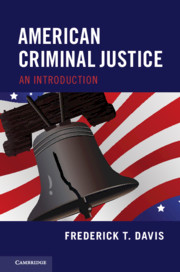Book contents
- American Criminal Justice
- American Criminal Justice
- Copyright page
- Dedication
- Contents
- Acknowledgments
- 1 Introduction
- 2 The Federal Structure; Sources of the Law
- 3 Investigation and Evidence-Gathering—The Participants
- 4 Investigation and Evidence-Gathering—Procedures
- 5 Arrest and Pretrial Detention
- 6 The Decision to Prosecute, or Not
- 7 Joinder of Charges and Defendants
- 8 Venue
- 9 Assistance of Counsel
- 10 Trial Rights and Preparation for Trial
- 11 Alternative Outcomes
- 12 Double Jeopardy
- 13 The Trial
- 14 Sentencing
- 15 Appeals
- 16 Corporate Criminal Responsibility
- 17 Internal Corporate Investigations
- 18 Professional Responsibility
- 19 Conclusion
- Bibliography
- Index
13 - The Trial
Published online by Cambridge University Press: 08 June 2019
- American Criminal Justice
- American Criminal Justice
- Copyright page
- Dedication
- Contents
- Acknowledgments
- 1 Introduction
- 2 The Federal Structure; Sources of the Law
- 3 Investigation and Evidence-Gathering—The Participants
- 4 Investigation and Evidence-Gathering—Procedures
- 5 Arrest and Pretrial Detention
- 6 The Decision to Prosecute, or Not
- 7 Joinder of Charges and Defendants
- 8 Venue
- 9 Assistance of Counsel
- 10 Trial Rights and Preparation for Trial
- 11 Alternative Outcomes
- 12 Double Jeopardy
- 13 The Trial
- 14 Sentencing
- 15 Appeals
- 16 Corporate Criminal Responsibility
- 17 Internal Corporate Investigations
- 18 Professional Responsibility
- 19 Conclusion
- Bibliography
- Index
Summary
We now come to trials. As noted in Chapter 11 and again in the Conclusion, Chapter 19, criminal trials are becoming less and less frequent in American criminal justice, virtually replaced by guilty pleas and other negotiated outcomes. But it is nonetheless critically important to understand their dynamics, because virtually the entire architecture of American criminal procedures is designed on the assumption that a trial—and particularly a jury trial—will take place as the ultimate check on the adversarial procedures in effect, and thus those procedures cannot make sense without understanding the trials around which they were conceived and developed.
There is no provision for trial in absentia, a trial in which the defendant is not physically present and without a specific consent from him. In federal courts, Rule 43 provides that a defendant “must be present … at every trial stage, including jury impanelment and the return of a verdict.” The Rule does provide that a defendant may be “voluntarily absent after the trial has begun.”
- Type
- Chapter
- Information
- American Criminal JusticeAn Introduction, pp. 80 - 100Publisher: Cambridge University PressPrint publication year: 2019



